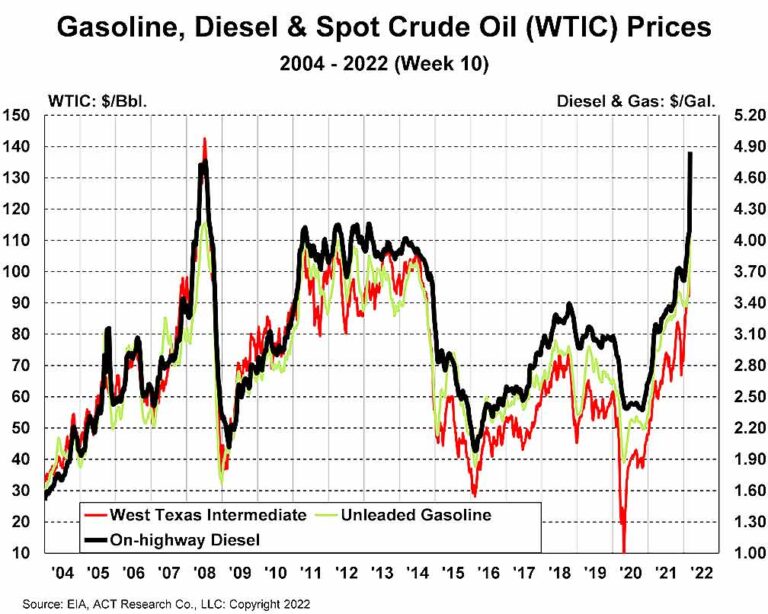COLUMBUS, IN – According to Americas Commercial Transportation Research Co.’s (ACT) latest release of the North American Commercial Vehicle Outlook, supply-chain constraints kept a lid on the industry’s ability to raise build rates through 2021, and just as the supply of chips was starting to improve, the risk to auto and truck manufacturing supply chains has risen once again.
Preliminary North American Class 8 orders in February came in at 21,000, just about even with January’s volume but less than half from a year earlier, ACT reported. The report noted that there have been 44,191 orders so far in 2021.
Kenny Vieth, ACT’s president and senior analyst, said that “energy markets aside, the global supply of neon, critical for laser lithography in semiconductor manufacturing, is concentrated in a Ukrainian export hub on the Black Sea. While supply-chain risks pile on to what manufacturers have been living with for the past five quarters, the spike in oil prices brings a different set of repercussions for the economy at large.”
Truck makers are only reporting orders that are scheduled to be built within 12 months, which is the current length of the backlog, Vieth said, and orders “have largely been mirroring production activity.”
He said that with “critical industry demand drivers at, or near, record levels, industry strength should be measured with long backlog lead times, rather than in tepid new order activity.”
Vieth added that “looking beyond the tragedy of the war, the challenge in understanding the impact of the situation on the domestic economy, and by extension commercial vehicles, is how long it will take for the situation to normalize. Implicit in oil prices remaining elevated, new supply-chain constraints are likely to occur, food prices will keep rising, and the corrosive effects of inflation will get materially worse.”
Vieth also noted that “for the guys who buy commercial vehicles, the virus continued to bend consumer spending to goods and away from services in early 2022. Backlogged freight should support activity through 1H’22, but the longer oil prices remain elevated, the more business and consumer dollars will be diverted from the stuff that gets moved by truck.”
The Trucker News Staff produces engaging content for not only TheTrucker.com, but also The Trucker Newspaper, which has been serving the trucking industry for more than 30 years. With a focus on drivers, the Trucker News Staff aims to provide relevant, objective content pertaining to the trucking segment of the transportation industry. The Trucker News Staff is based in Little Rock, Arkansas.











